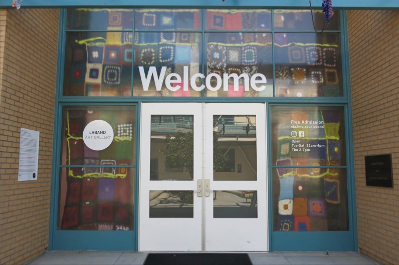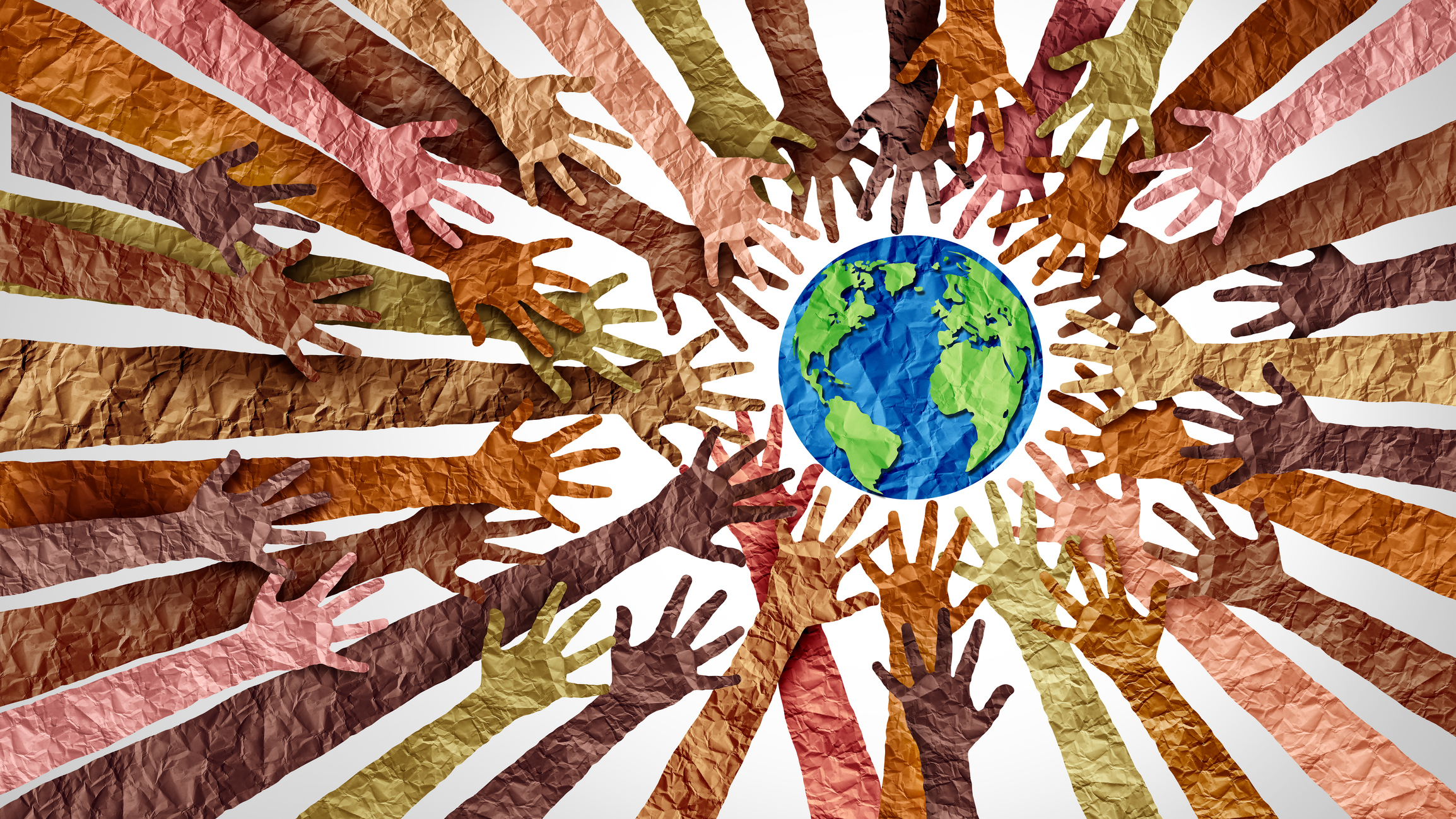In the midst of a pandemic, world-wide social unrest and national search for a moral compass, extraordinary creativity and hope abounds.
We invite you to join us for our annual symposium highlighting the work of the LMU community and beyond with justice as the fundamental theme. The symposium sets the stage for all interested in listening, discovering and responding as we continue our journey towards transformation within ourselves and as part of our commitment to our community. In a time filled with much divide, our desire that "all may be one" becomes an ever more essential message and mission of the CSJ Center.
Please review the schedule for information on specific topics as well as the list of speakers who will be joining us. All sessions are free, virtual and open to the public. If you would like to attend with a group/class, please email Stefani Mejia at stefani.mejia@lmu.edu.
Access the official symposium program here.
Opening Event (Virtual)

Monday, January 31
5:00pm-6:00pm (PST)
Opening Remarks by Judith Royer, CSJ, Director of the CSJ Center for Reconciliation and Justice
Tour of "June Edmonds: Full Spectrum" exhibition currently at LMU's Laband Art Gallery. The artist June Edmonds is in conversation with José Miguel Camacho '22, Laband Education Assistant.
Special pre-recorded performances by the LMU Choir curated by Todd Harper, Chair of Music and Director of Choral Activities, Loyola Marymount University
Day 1: Tuesday, February 1, 2022
-
In the past year, border law and policy has seen whiplash-inducing ups and downs. Out of the gate, the incoming Biden administration made good on certain of its campaign promises in the area of immigration but deferred on others. Later, federal courts dealt severe blows to progress, reversing attempts to restore protections dismantled by the prior administration. Throughout, vulnerable immigrants amassed at our southern border in record numbers. This panel discussed the current situation at the border from a humanitarian, legal, and Christian perspective.
Amalia Cortina, Advocate for Immigrants
Troy Elder, Migration Missionary, Attorney Episcopal Diocese of San Diego
Suzanne Jabro, CSJ, Founder of Border Compassion
Maria Elena Perales, Director, Justice Center, Sisters of St. Joseph of Orange (Moderator)
Gustavo Sermeño, U.S. Asylum Seeker
-
This session discussed the historical and current works of justice in the Southland by the Sisters of St. Joseph of Carondelet, Los Angeles Province, and the Sisters of St. Joseph of Orange. A moderated panel discussion featuring leaders from both congregations and sponsored institutions and organizations.
Mary Rose Batungbacal, Principal, St. Mary’s Academy
Katherine ‘Kit’ Gray, C.S.J., Sisters of St. Joseph of Orange
Shannon Green, Director, The CSJ Institute of Mount Saint Mary’s University
Michael McNaught, Assistant Director, Center for Religion and Spirituality, LMU (Moderator)
Maureen O’Connor, C.S.J., Leadership Team, Sisters of St. Joseph of Carondelet, Los Angeles Province
Shawna Smith, Executive Director, Hope Builders
Jeffrey Thies, former Vice President, St. Joseph Health
-
Holding Still is a riveting, candid and insightful short documentary film about practicing Centering Prayer while incarcerated at Folsom Prison. The film focuses on a diverse group of men speaking candidly about their years-long practice. They share their stories and wisdom with the intention of bringing this practice to other incarcerated men and women, knowing the power of the practice to heal trauma and transform toxic shame.
Through personal testimony, viewers will understand and more importantly emotionally connect with the experience of recovery each individual describes. These men share their deepest emotions and profound experiences. At the conclusion, Mary Trunk has an intimate conversation with former inmates Lawrence Hamilton and Artist Knox.
Produced by Prison Contemplative Fellowship (https://www.uspcf.org/).
Mary Trunk, Director and Assistant Professor in Film, Mount St. Mary’s University
Ray Leonardini, Producer and Prison Contemplative Fellowship
-
The CSJ Center for Reconciliation and Justice at Loyola Marymount University and the Mission Leadership Institute at Providence St. Joseph Health present a collaborative project titled Paths and Moments. The Mission Leadership Institute offers whole-person development in health care for aspiring and current Mission Integration Leaders as well as high potential leaders. The production features the incredible journey of three mission leaders within Providence St. Joseph Health -Theresa Bervell, John Kleiderer, and Roseanne Ponzetti .
Paths and Moments is directed by Judith Royer, CSJ. Interviews with the mission leaders were written into first person narratives by playwrights Doris Baizley, Bonnie Banfield, Catharine Dada, ValLimar Jansen, Mary O’Malley, and Luis Selgas; edited for this presentation by Doris Baizley and Bonnie Banfield. The screening concludes with a panel discussion, including featured mission leaders from Providence St. Joseph Health as well as the company members that brought their stories to the screen.
Doris Baizley, Adjunct Professor, Theatre Arts, Loyola Marymount University
Nancy Jordan, Associate Vice President & Chief Mission Integration Officer, Providence Mission Leadership Institute
Judith Royer, CSJ, Professor Emeritus, Theatre Arts, Loyola Marymount University
Martin Schreiber, Vice President, Providence Mission Leadership Institute
Day 2: Wednesday, February 2, 2022
-
This session examined the imperatives of environmental justice and sustainable development in business.
Jeff Thies, Director, Institute for Business Ethics and Sustainability, Loyola Marymount University
Jerilyn Lopez Mendoza, Former Harbor Commissioner, City of Los Angeles
David Pettit, Senior Attorney, Climate & Clean Energy Program, Natural Resources Defense Council
-
As part of the 2021-2022 Bellarmine Forum, Dr. Nadia Kim presents on environmental justice and activism in Los Angeles. In our global cities today, immigrants of color and their children are increasingly suffering hyper-pollution and alarming rates of asthma and cancer (and covid-19) due to their residence near diesel-spewing shipping ports, freeways, and rail yards, and near the oil industry that props them up -- all of this to ensure a constant flow of consumer goods from China to LA (i.e., not just the City of Hollywood but the City of Oil) and to the rest of the nation. To chronicle how Asian and Latina immigrant women have led resistance movements against such environmental injustice -- among the most dynamic efforts for social change in our global cities -- Kim examines how the activists redefine racism, classism, and the meaning of citizenship as a cornerstone of their politics. They do so by deeming the neoliberal nativist racist state as a system of physical and emotional violence and neglect, thereby responding with a politics that centers an ethics of care for each other's physical and emotional needs.
Dr. Nadia Kim, Professor of Sociology, Loyola Marymount University
-
What are academic libraries doing to advocate and better serve the community of people with disabilities? How does this work connect with serving the community overall on a university campus and making the learning process more accessible?
The discussion takes a broad view of the following:
• Access to information resources
• Technology (mobile technology, assisted learning design, E-reader use)
• Providing open access from an economic perspective (open access, pay walls; vendor participation)
• Access to physical spaces
• Collaboration/partnerships (present and future)Speakers include:
Amanda Apgar, Assistant Professor, Women’s and Gender Studies, Bellarmine College of Liberal Arts, LMU (Moderator)
Darlene Aguilar, Instructional Design Librarian, Reference & Instruction Services, William H. Hannon Library, LMU
Marie R. Kennedy, Serials & Electronic Resources Librarian, Acquisitions & Collection Development, William H. Hannon Library, LMU
Susan Scheibler, Chair and Associate Professor Film, Television, and Media Studies, School of Film and Television, LMU
Day 3: Thursday, February 3, 2022
-
This dynamic panel discussion explores the multitude of ways to pursue a passion for social and restorative justice professionally. Panelists from education and non-profit sectors will share their path to restorative and other forms of justice work. The discussion includes an exploration of the impact these practices are currently having and will have in the future, including action toward dismantling systemic oppression. Gain insight and recommendations for your next steps toward furthering restorative justice practices on campus and in our community.
Dr. Nikki Chamblee, Restorative Practices Coordinator, DeSoto Independent School District
JC Nieblas, RJP School Specialist, National Conflict Resolution Center
Reuben Roberts, Restorative Justice Schools Coordinator, Restorative Justice for Oakland Youth
Jessie Tena, Restorative Practitioner/Trainer, National Conflict Resolution Center
Julie Vue, Director of Youth and Education Program, OC Human Relations
Julia Wade, Associate Director for Restorative Practices, Office of Student Conduct & Community Responsibility, Loyola Marymount University (Moderator)
-
Recognizing the disproportionate impact of COVID-19 on racial and ethnic groups in the U.S., as well as the dire need for data informed legislation, a COVID-19 communities of color (COC) needs assessment was launched on behalf of members of several congressional caucuses by The Alliance of National Psychological Associations for Racial and Ethnic Equity (The Alliance). Findings revealed more than a pandemic for communities of color; COVID’s impact represented a syndemic for these communities. Key findings and implications will be shared. Representatives from each of the Alliance organizations will present along with the project principle investigator, Cheryl Grills. This includes: The Asian American Psychological Association, The Association of Black Psychologists, The Indigenous Wellness Research Institute, The National Latinx Psychological Association, and The American Psychological Association.
Dr. Cheryl Grills, Director, Psychology Applied Research Center (PARC), Loyola Marymount University
Dr. Robert Hurteau, Director, Center for Religion and Spirituality (Introduction)
-
As part of the 2022 CSJ Center Symposium, the CSJ Center for Reconciliation and Justice in collaboration with Jewish Student Life presents Flowers Aren't Enough. Flowers Aren't Enough is a monologue that tells the story of Michal, a young woman from an upper-middle-class family who finds herself in an abusive relationship. Michal describes how her partner gradually narrows her world isolating her from her surroundings. We witness Michal sinking into darkness and then watch how she takes charge of her life, and rediscovers herself. Based on true stories, Naomi Ackerman weaves the voices of women from different cultures and backgrounds into a performance that encourages social change. Naomi Ackerman is an experienced actress, consultant, and facilitator creating curriculum that use drama techniques to deal with social, gender, and educational issues as well as exploring identity and promoting tolerance and dialogue between diverse participants.
The production will conclude with a panel discussion featuring Naomi Ackerman in conversation with Rabbi Steven Carr Reuben, Founding Director of Home Shalom, and Judy Vaughan, CSJ, Founding Director of Alexandria House.
